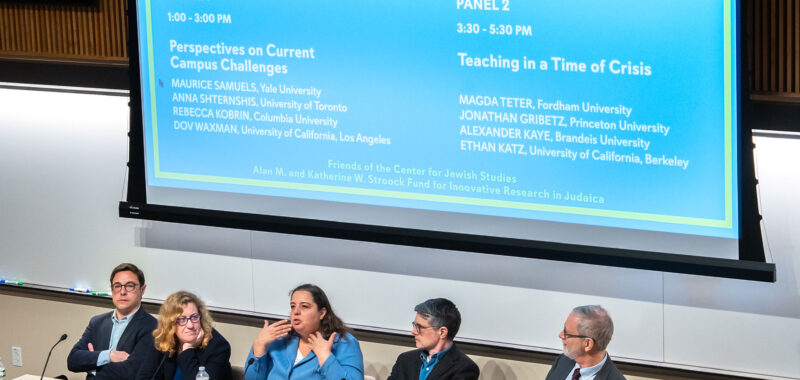Jewish Studies faculty from eight North American universities came to Harvard this month to discuss rising antisemitism on their campuses.
The half-day conference, convened Dec. 10 by Derek J. Penslar, the William Lee Frost Professor of Jewish History and director of Harvard’s Center for Jewish Studies, kicked off with a panel discussing campus challenges during the 14 months since Hamas’ Oct. 7 massacre. Professors whose schools experienced high-profile protests in the spring touched on everything from media coverage to hidden gender dynamics within student activism. On the topic of antisemitism, the scholars said that the worst animus has been directed at Israeli students, staff, and faculty, while members of the broader Jewish community have endured targeted pressure to denounce Israel.
“What we’ve seen over many years is growing anti-Zionist sentiment on many college campuses, which often becomes a kind of anti-Israelism,” said Dov Waxman, professor of Israel studies and director of the Y&S Nazarian Center for Israel Studies at the University of California, Los Angeles. “In other words, it’s not just a principled demand for equal rights for Palestinians. It’s not just an opposition to Israel as a Jewish state … but an aversion to anything to do with Israel or anybody associated with Israel.”
Maurice Samuels, a French professor at Yale and director of the Yale Program for the Study of Antisemitism since 2011, emphasized an urgent need for Jewish studies curricula amid the emergence of a “new antisemitism.”
“How are student protesters supposed to know that they’re recycling tropes of classical antisemitism if they’ve never studied those tropes? We need to provide that education.”
Maurice Samuels, director of the Yale Program for the Study of Antisemitism
Classic forms of antisemitism, he said, excluded Jews for their supposed racial difference. “By contrast, the new antisemitism would be more likely to accuse Jews themselves of being racist for supporting what they see as a Jewish ethnostate in Israel,” said Samuels, who has pushed to include antisemitism in campus conversations on race.
Related to these issues, he added, is the place of anti-Zionism in competing definitions of antisemitism. Some organizations, like the International Holocaust Remembrance Alliance, equate all forms of anti-Zionism with antisemitism, while other groups allow for various shades of distinction. The definitions converge around anti-Zionist expression that relies on the racist tropes of classic antisemitism, Samuels said.
“We’ve all seen examples of this over the past year, in which hoary conspiracy theories about Jews controlling finance and the media are trotted out to protest against Israel along with signs and symbols from the Nazi era,” he said. “Are all of these kinds of protests antisemitic? Are some of them? How are student protesters supposed to know that they’re recycling tropes of classical antisemitism if they’ve never studied those tropes? We need to provide that education.”
Picking up on the themes of anti-Zionism and anti-Israel bias was the University of Toronto’s Anna Shternshis, who directs the Anne Tanenbaum Centre for Jewish Studies. Shternshis, whose campus has seen increased calls to halt collaborations with Israeli researchers and institution, has heard from Israeli graduate students who were dropped by their advisers and from others who felt pressured to condemn their own family and friends living in Israel.
“It doesn’t matter what political views they had,” Shternshis said. “People with Israeli names, Israeli accents — they were immediately put on the stand.”
On the positive side, the school’s Jewish community has united like never before, she said, including through collaboration on their own definition of antisemitism. Shternshis excerpted one of the statement’s key passages: “Using ‘Zionist’ or ‘Zionism’ as a proxy for ‘Jewish’ or ‘Judaism’ does not excuse discriminatory or harassing actions.”
The conference featured a second session on teaching Jewish studies in a time of crisis, with faculty from Fordham, Princeton, Brandeis, and the University of California, Berkeley, stressing the need to bolster civil discourse skills for the classroom and beyond. Penslar, who also co-chairs Harvard’s Presidential Task Force on Combating Antisemitism and Anti-Israel Bias, ended both sessions by fielding audience inquiries on everything from the role of advocacy and “safe spaces” to why some U.S. universities have struggled far less with antisemitism.
Rebecca Kobrin, an associate professor of American Jewish history and co-director of Columbia University’s Institute for Israel and Jewish Studies, picked up on the last topic by praising Dartmouth College, highlighting its popular course on the Arab-Israeli conflict, co-taught by two scholars with complementary expertise in Jewish and Middle East Studies.
“What happens in the classroom is how you change the narrative,” Kobrin said. “It is really helpful to have a class where two professors show that there are two opposing views — and the students have to learn to talk to each other about it, just like the professors.”
Source link

